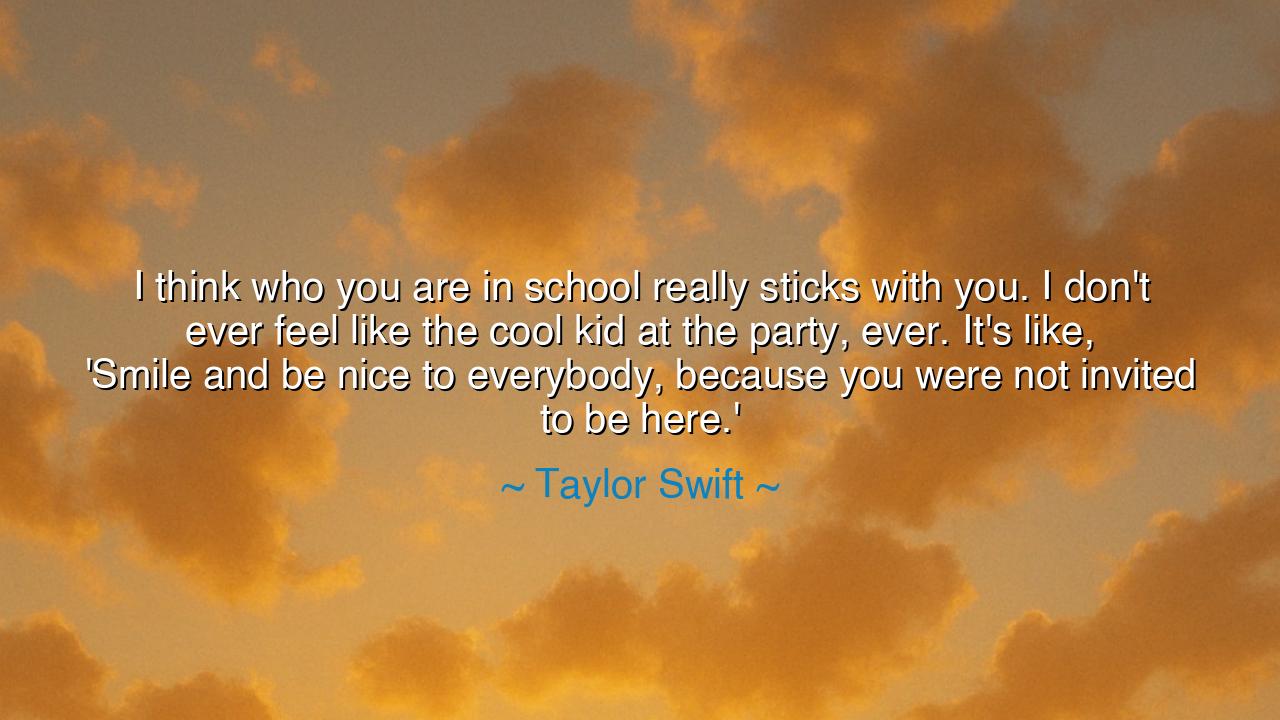
I think who you are in school really sticks with you. I don't
I think who you are in school really sticks with you. I don't ever feel like the cool kid at the party, ever. It's like, 'Smile and be nice to everybody, because you were not invited to be here.'






In the poignant words of Taylor Swift, “I think who you are in school really sticks with you. I don't ever feel like the cool kid at the party, ever. It's like, 'Smile and be nice to everybody, because you were not invited to be here,’” we are confronted with the deep and lasting influence that early experiences and self-perception can have on the way we navigate the world as adults. Swift reflects on the pain of feeling like an outsider, the feeling that even when you have achieved success or recognition, there remains an inner unworthiness that lingers from the days when you were excluded or marginalized. In this admission, there is both vulnerability and honesty, as she acknowledges that even the most accomplished among us may struggle with the scars of the past.
This sentiment is rooted in the wisdom of the ancients, who understood the profound impact that youth and identity have on shaping the individual’s future. In Greek philosophy, Socrates taught that the soul of a person is molded from an early age, influenced by their experiences, relationships, and the society around them. For Socrates, the formation of character in youth was crucial—how one is treated, what they are taught, and how they come to see themselves. In this light, Swift’s words resonate deeply: the identity forged in the formative years of school can leave an indelible mark that lingers long into adulthood, shaping our interactions with others, our confidence, and our sense of belonging.
Similarly, in the life of Cicero, the great Roman orator and philosopher, we see the power of early experiences in shaping one’s destiny. Cicero’s early years were marked by the exclusion from the political elite due to his social class, yet he rose through his sheer intellect and skill in rhetoric. Still, Cicero always carried with him a sense of displacement, the feeling that he did not belong to the highest echelons of Roman society, despite his great achievements. His life serves as a reminder that even those who rise to the heights of power and prestige often carry with them the emotional weight of early exclusion. Just as Swift reflects on the feeling of not being the “cool kid,” Cicero, too, struggled with a sense of alienation, despite his success.
In the story of Nelson Mandela, we see a man who, despite being rejected and imprisoned for much of his life, maintained a deep commitment to his moral values and beliefs. Mandela’s journey of overcoming rejection and oppression mirrors the feelings that Swift expresses—the challenge of self-worth even when society, or certain groups within it, seems to reject or exclude you. However, Mandela, rather than internalizing that rejection, used it as a catalyst for change, seeing belonging not as something defined by acceptance from others but as something he could define through his own principles. His courage and grace in the face of exclusion offer us a lesson in how we can redefine our sense of worth and belonging, even in the most difficult circumstances.
Swift’s words also point to the universal human experience of imposter syndrome—the feeling of being undeserving or that one does not truly belong, despite outward appearances of success. This feeling is not unique to her; it is a struggle faced by many, even those who have achieved greatness. Imposter syndrome has been documented among scientists, artists, leaders, and performers—individuals who, despite their accomplishments, still feel as if they are pretending or that their success was a matter of luck rather than merit. Swift encapsulates this universal truth in her reflection, showing that even those who are widely admired and beloved can carry the silent burden of feeling like they do not belong.
The lesson in Swift’s quote is clear and powerful: the experiences of exclusion in youth can shape us deeply, but they do not define us. Just as Socrates, Cicero, and Mandela faced moments of alienation, we too can learn to rise above those feelings. The challenge is to acknowledge these feelings without letting them dictate our actions or sense of self-worth. Swift teaches us that we can find peace in self-compassion and authenticity, and we can choose to embrace our insecurities as part of what makes us human, rather than as limitations to our success.
In practical terms, Swift’s words encourage us to confront our inner doubts and to recognize that our worth is not determined by the approval or acceptance of others, but by the values we hold and the integrity with which we live. When we are faced with moments of rejection or self-doubt, we must practice kindness to ourselves and recognize that these experiences do not define who we are. Let us look to the example of Mandela, who found his strength in his principles and his ability to transcend exclusion. By embracing who we are and staying true to our values, we can overcome the weight of alienation and find our place in a world that often feels difficult to navigate. Just as Swift reminds us to smile and be kind, we must also remember that we are worthy of the spaces we occupy, even if the world makes us feel like we were not invited. Acceptance comes not from external validation, but from within.






AAdministratorAdministrator
Welcome, honored guests. Please leave a comment, we will respond soon